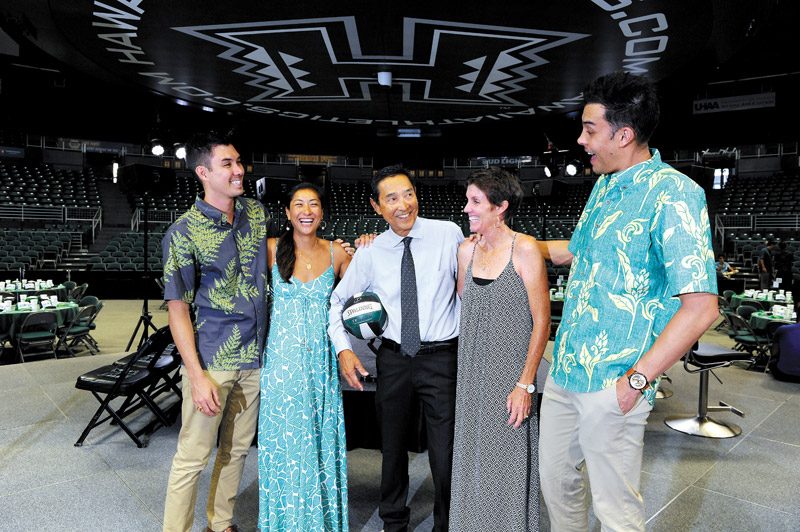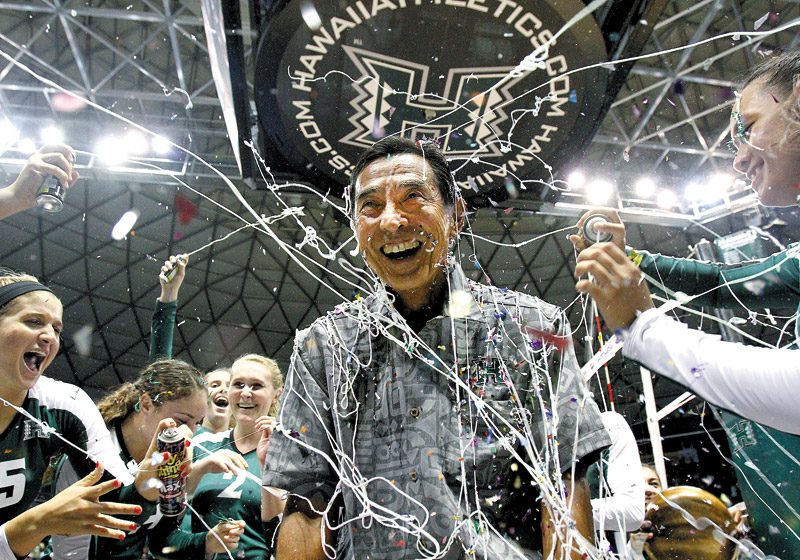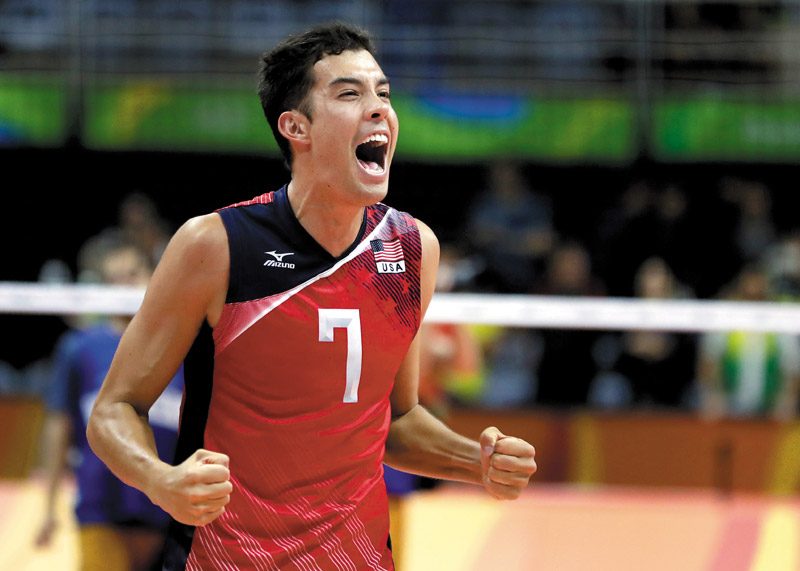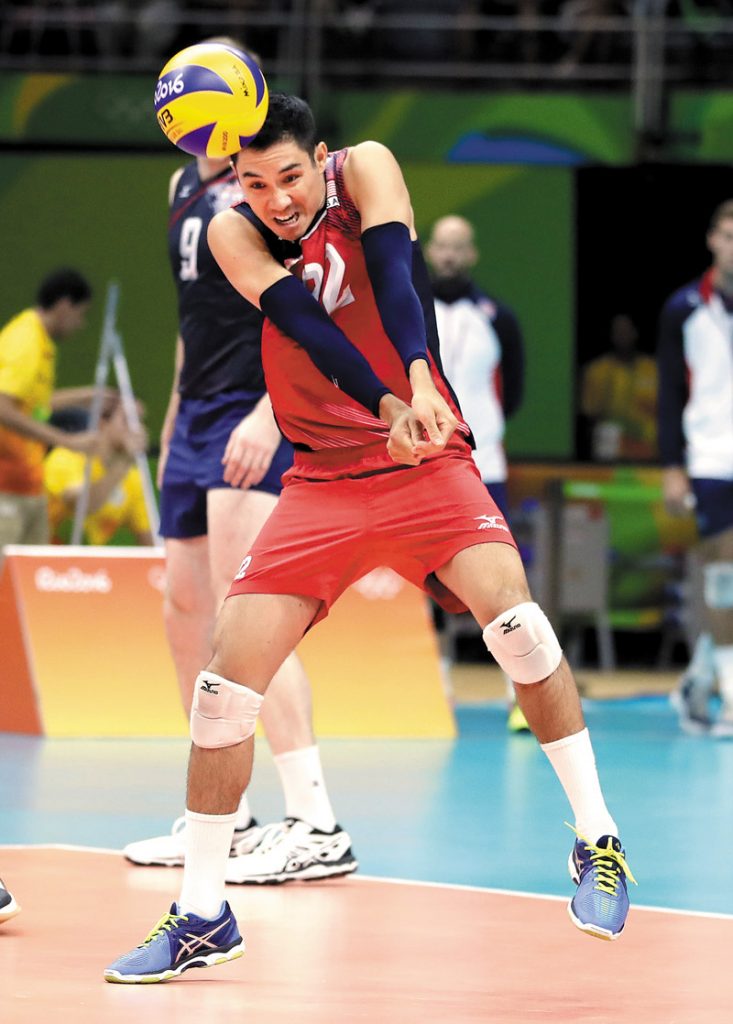Life After Wahine Volleyball

The Shojis — Erik, Cobey Hutzler, Dave, Mary and Kawika — share a laugh following the Dave Shoji Aloha Ball Retirement Celebration May 21 at the University of Hawai‘i Stan Sheriff Center.
It’s a whole new world for retired University of Hawai‘i coach Dave Shoji and family, who are learning to dig life outside of the Rainbow Wahine Volleyball spotlight.
The last time we saw Dave Shoji, he was smiling and waving to his many fans and friends as they gave him a heartwarming send-off at the University of Hawai‘i Stan Sheriff Center in late May. The Dave Shoji Aloha Ball Retirement Celebration turned out to be the perfect way to say goodbye to a brilliant career that spanned 42 years and made him the second-most winningest coach in NCAA history. It also helped raise more than $130,000 to support the program and establish the Dave and Mary Shoji Scholarship Endowment Fund, which will provide much-needed scholarship dollars for UH women’s volleyball student-athletes.
“It was an incredible night,” Shoji says. “The community gave me so much aloha. It was very gratifying.”
Even his family, a few of whom had to fly in for the occasion, seemed taken aback by the outpouring of love.
“So overwhelming and humbling,” says Shoji’s wife, Mary. “We are forever grateful.”

Dave Shoji has had a successful 42-year career as head coach of the Rainbow Wahine, during which he became the all-time winningest coach in NCAA Division I women’s volleyball history, and the second-most winningest coach in NCAA history. PHOTO COURTESY COURTNEY METZGER, UH ATHLETICS
“It’s the first time the whole family has been together in the same place since my kids were born; it was like a family reunion,” adds Shoji’s daughter, Cobey Hutzler. “It was so incredible to see and feel that support.”
“The Aloha Ball was a great celebration and it brought a lot of closure to us, really,” observes youngest son, Erik, “especially after the last few months of craziness.”
That unusual craziness in the Shoji household refers not only to the retirement announcement for the 70-year-old coaching legend, but also his bout with prostate cancer. Yet despite his advancing age and recent cancer treatments, Shoji is hardly slowing down. He plays golf at least two or three times a week (and still boasts a single-digit handicap), and he’s also picked up a new hobby in stand-up paddleboarding. “I think it’s his new favorite passion,” says Mary of her husband’s twice-a-week passion.
Then, anticipating the forthcoming question about Shoji’s cancer scare, she adds, “Dave is doing fabulous. He finished his radiation treatment, and his numbers continue to be very good. The doctors say they’re very confident that his treatment has been successful.”

Kawika (showing his exuberance following a sideout for Team USA).
Even Shoji admits to feeling better these days. He says the family has rallied around the doctors’ advice and care, and everyone else has been “so positive and supportive.” Still, it wasn’t easy when he received the difficult news near the conclusion of the Rainbow Wahine volleyball season last fall. “Yes, it was rough,” he confesses. “There was a lot of anxiety and doubt.”
“It was shocking at first,” recalls Cobey. “I mean, he’s the healthiest 70-year-old you’ll ever see.”
A former Rainbow Wahine volleyball player and volleyball coach herself, Cobey received the news while in South Carolina, where her husband, Coleman Hutzler, serves as an assistant football coach for the University of South Carolina. Her younger brothers, Kawika and Erik, who are both Olympic volleyball players from the 2016 bronze medal-winning team and members of the USA National Team, were informed of their father’s situation while playing volleyball halfway around the world.
“Kawika and I were in Russia, and initially, it was a shock,” Erik recalls. “We immediately told our parents we wanted to come home. But Dad said he believed in what the doctors were saying (about the impending) treatment, and he supported us staying where we were.”
Ultimately, the family had to dig in and rely on its faith. “When faced with adversity, we had our God to lean on,” says Mary. “That made us very hopeful, very confident that things would go well. We never sat down (with Dave) and said, ‘Oh, poor you.’ We were always very positive.

The Shoji volleyball legacy lives on with sons Erik (deftly handling a pass)
“I think the toughest part might have been on the kids. The distance was very challenging for all of them,” she continues. “Kawika was probably the strongest, Cobey had the biggest struggle, and Erik is like Dave: He keeps things to himself, so it’s often hard to tell.”
“Our relationship with God has always been strong,” adds Cobey, “and that made it easier. When your faith is strong, you’re strong.”
Once Shoji decided to go public with his diagnosis and treatment, and despite a good prognosis, the whole situation refueled talk of retirement, which had already been a hot topic for years.
“I thought he was going to retire a few years ago, but then he recruited Nikki Taylor and that group of players, and that seemed to re-energize him,” says Mary. “I thought, ‘Hey, he still really likes it,’ so I was very supportive of him going as long as he wanted to.”
“We knew it was coming eventually,” Cobey adds, “but with the diagnosis, his health became the No. 1 priority. Still, we didn’t know. He’s such a private person; he kept it to himself. That’s just the way he is — his highs are never too high, and his lows are never too low. Yes, he gets fired up every once in a while, but he rarely shows it.”
Finally, while his treatments progressed and the talks about retirement intensified, Shoji made his decision. “(Athletic director) Dave Matlin and I sat down several times and we talked about many things,” recalls the man who took over the UH volleyball program in 1975, when he was just 28. “At the time, I was undergoing treatment and so I couldn’t devote myself full time. Still, one scenario was that I would come back. It kind of depended on who might be available (as successor). Once Robyn (Ah Mow, a former Rainbow Wahine who became an Olympian and then Shoji’s lead assistant the last few years) expressed her intent that she was interested, we felt it was the right time. That’s how it evolved.”
And with that, Shoji — the legendary Rainbow Wahine volleyball head coach with 1,202 wins in a brilliant career that spanned more than four decades and included four national titles (1979, 1982, 1983 and 1987) and 25 conference titles — announced his retirement.
He certainly won’t have any trouble staying busy. His aforementioned golfing and stand-up surfing outings should keep him physically strong, and there are other ways he plans on staying active. Last month, for example, Shoji appeared with Kawika and Olympic teammate Micah Christenson at a volleyball clinic at Kamehameha. And, of course, his now freed-up schedule means more time to spend with grandchildren Micah, 4, and Leila, 2.
“He came up to South Carolina after going to the Masters (golf tournament) in April, and it was so fun,” recalls Cobey. “Now, whenever he calls me, he immediately asks about Micah. ‘Did you play ball with Micah today? It’s important you do it every single day.’ I tell him, ‘Don’t worry, Dad. Just because you raised two Olympians doesn’t mean you’re going to get another!'”
Without the day-to-day grind of running a collegiate volleyball team, the Shojis are enjoying the sudden freedom of being able to drop things and jet off to faraway destinations. Case in point: The couple’s whirlwind trip through northern Europe earlier this summer. “The boys were playing in Europe, and we looked into it and we decided on a Tuesday, and we left the next day on Wednesday,” explains Mary. “We flew from Seattle to New York to Paris and then drove to Berlitz, France. We saw three matches over the next three days. It was great to go and support the boys, but we also had time to take a little vacation. It was nice to sit at the sidewalk cafes to stroll past the boutiques, and see the pretty countryside. The towns were all quaint and the people so friendly.”
“I couldn’t believe they were able to make the decision so quickly,” Erik says. “But it makes sense now; summer had always been time for recruiting before. Now they had time to fly halfway around the world.
And it was really neat to see them cheering us on, wearing their red, white and blue.”
The 13-day trip continued from France to Poland, where they saw three more matches and watched as the Shoji brothers helped the U.S. qualify for the World League FIVB Semifinals, which were played later in Brazil. Dave and Mary Shoji juggled their own schedules with those of their globetrotting volleyball sons and also had the opportunity to see and experience places they had never been to before.
“Poland was more revitalized than I thought, but there were areas where you could still see rubble from World War II and the Soviet occupation. We also took the Auschwitz tour, something we had always read about, but to see it up close where it happened was so sobering.”
In recent days, Dave and Mary have been talking about taking more trips to South Carolina (where he’s already turned into “a big Gamecock fan,” according to Cobey) and traveling to wherever Erik and Kawika are scheduled to play. And yes, the couple plans on attending their share of upcoming Rainbow Wahine games.
“I’m itching to get into the arena to watch the girls play this season,” the former head coach admits. “Robyn is a heckuva coach, and I’m always there for her when she calls me. We’ll go as much as we can.”
Regarding the family’s outlook for the coming volleyball season, Cobey says, “While none of us is really sure what life without Wahine volleyball is going to be like for Dad and our family, as it’s all we’ve ever known our entire lives, we are so happy that the program is staying within the Wahine family with Robyn Ah Mow (and her assistants), Ang (Ljungqvist) and Kaleo (Baxter). Knowing it’s being handed down to them makes the transition a little smoother for all of us and will make it so easy to continue to cheer them on.”
As for how involved her father will be with the team this season, Cobey is taking a wait-and-see approach. “Better check in with Robyn in August and ask how many times Dad has texted or come by practice,” she says, chuckling. “Only come the fall will we really know how he’s truly adjusting.”






